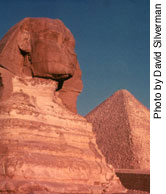
|
BENCHMARKS
|
The Sphinx and Pyramid at Giza, Egypt, representative of the big questions that the International Research Conference Program seeks to explore: issues that might encompass politics and power, architecture and environment, aesthetics, religion, time, and cultural change. |
 |
The conference structure will be driven by papers circulated among participants at least a month in advance of the conference. These will be the starting point for the discussions held in closed sessions. Initial discussions will be followed by a consideration of cross-cutting issues and will conclude with an overarching synthesis of ideas. The conferences will be held at Penn at comfortable sites with meeting rooms and dining spaces that are conducive to lively interaction. Every effort will be made to create an atmosphere in which participants can meet without interruption or distraction. Penn Museum will provide coach airfare, lodging, and all meals in addition to covering all of the administrative costs.
Following the conference the ideas and thinking will be disseminated through three different media. Immediately after the conference, Penn Museum will host a lecture or forum at which one or several of the participants will speak to the interested community and wider public about the ideas discussed at the gathering. Then a website—accessed through Penn Museum’s home page—will facilitate the dissemination of the ideas and thinking to both the general public and interested professional communities. Finally, and most importantly, the participants will rewrite their papers, taking into account the ideas generated and shared during the conference. This group of papers, edited and introduced by the conference organizer, will be submitted to Penn Museum Publications for peer review and publication in a timely manner.
The goal of this collaborative effort is no less than the generation of new knowledge and understanding: interaction within the conference setting is expected to move the study of human culture and societies forward. We are working for new insights into the nature of human evolution, human behavior, culture, and society—fresh understanding of the past as well as of contemporary issues. Possible topics of inquiry include the rise of complex cultures, the collapse of ancient and modern societies, the nature of political power, the impact of the changing environment on human societies, the development of writing and other communication systems and communication within and between communities. Topics already under consideration include: “Landscapes of Movement: Trails, Paths, and Roads”; “Comparative Diplomatics: Historical and Cultural Implications”; “Evolution of Mind”; and “Forces of Nature: Environmental Risk and Resilience as Factors of Cultural Change.” Proposals on topics relevant to the study of humans and human societies, drawing on a variety of Penn departments and schools, are welcome.
We are excited about the possibilities for new knowledge of the human condition generated through our International Research Conference Program. I invite all in our wider community to submit inquiries or proposals to Professor Holly Pittman, Deputy Director for Academic Programs (hpittman@sas.upenn.edu), who will coordinate the conferences through my office. We hope that this initiative will attract the interest of Penn scholars who seek an innovative structure to support their study of humans and human societies, across time and space, and that it will move us all toward a new era of integrated thinking in the human sciences.
 Penn Museum
Penn Museum